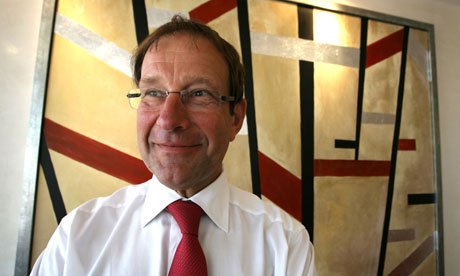|
Express and Star owner gave inquiry the real deal and showed how
reluctant he is to return to a revamped PCC
|
 |
|
Richard
Desmond's evidence to the Leveson inquiry showed how
reluctant he is to return to a revamped PCC. Photograph:
Susannah Ireland /Rex Features |
Say what you like about Richard Desmond, but in a week of uncommonly
sharp suits and unexpectedly refined voices, Lord Justice Leveson got
the real deal from the owner of the Express and Star newspapers, as he
conceded he didn't understand ethics, voiced hatred of Paul Dacre, and
proposed replacing the Press Complaints Commission with his own "RCD
committee" (a play on his initials) of cronies. This is how Desmond
thinks – a man convinced of his outsider status, who is instinctive not
intellectual, and driven by a desire to make money and prove his critics
wrong. But while Leveson saw the truth, he also saw the problem – how
reluctant Desmond is to return to a revamped PCC, and how unclear it is
what, if anything, would satisfy him.
Don't doubt then that Desmond's testimony, for all the entertaining
sideswipes at the Mail, was a disaster. What did he think he was doing
going before a public inquiry, offering gags as solutions, and being so
dismissive of that oh-so-passé notion, ethics? So it is tempting to give
up. Let the publishers that care set up their own body with improved
mediation and regulation, and let Desmond's newspapers bear the brunt of
the criminal law.
Leveson looked as if he was keen on that option, as Desmond's testimony
ended abruptly with no questioning from the presiding judge. Even Sheryl
Gascoigne got closing questions; it is normally the point where he likes
to test a hypothesis. But while most of us need not worry too much about
Desmond, this is not an option for the judge.
Leveson's problem is the McCann test. Gerry and Kate McCann were
repeatedly libelled by the Desmond titles, and made the point before the
judge (who showed he valued them by inviting them to give evidence) that
nobody lost their job when the publisher agreed to pay out £550,000 and
issue four front page apologies, as it admitted it was wrong to
speculate, with no supporting evidence, that the couple had killed their
daughter.
Leveson cannot credibly propose a reformed PCC that won't cover Desmond
– because the McCanns won't be impressed by a system that leaves the
possibility of something similar happening again.
This is not to say that Desmond is entirely wrong. He is right to
criticise the PCC as a club too often chaired by Tory grandees, and to
question whether serving editors should be involved, sitting in judgment
on their rivals. He is right, too, to be upbeat about Ofcom, which does
not suppress investigative journalism, as the authorities in Turkey (who
hated the Duchess of York's ITV film about orphanages) might like to.
But it is bizarre to suggest that the PCC, an organisation with no power
of prior restraint, should have somehow intervened to save the Express
and Star titles from themselves. Under self-regulation it is essentially
the newspapers' job, after all.
Two options remain as a result of his intransigence. There's the
much-hyped carrot, where club members keep the VAT reduction and
membership of sales audit bodies, and perhaps benefit from access to
cheaper mediation and lower libel payouts. Except even 20% VAT on a 30p
Daily Star is an affordable 6p. There are ways of publishing audited
sales numbers without being part of the ABC – the Times and Sunday Times
publish independently audited figures for paywall subscribers. And it is
not obvious that a two-tier payout system can be fair on litigants, who
should be compensated in proportion to the wrong suffered.
That only leaves one solution – a statutory requirement for all
newspapers to be part of the PCC-plus. Owners of major titles cannot be
allowed to opt out; either that, or there is no point having a revamped
PCC at all. |


